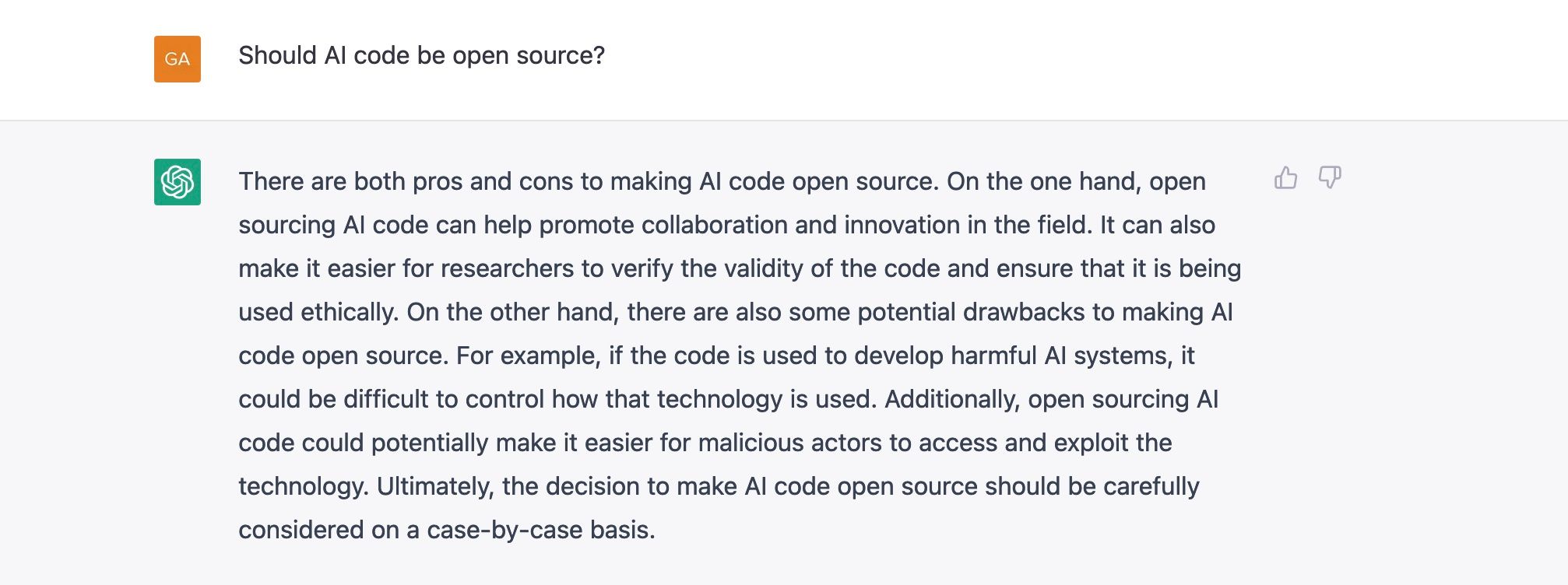Federal Trade Commission Probes OpenAI's ChatGPT

Table of Contents
The FTC's Investigation into OpenAI and ChatGPT
The FTC's investigation into OpenAI and ChatGPT stems from its authority under Section 5 of the FTC Act, which prohibits unfair or deceptive acts or practices. This investigation likely centers on concerns about potential violations related to data security, consumer protection, and misleading claims about ChatGPT's capabilities. The FTC is examining whether OpenAI's practices fall short of legal requirements, potentially impacting not just OpenAI but also setting a precedent for other AI developers.
- Potential Violations of Data Privacy Laws: The FTC is scrutinizing OpenAI's data handling practices, particularly concerning the collection, use, and protection of user data fed into ChatGPT. This includes assessing compliance with various data privacy regulations, such as the California Consumer Privacy Act (CCPA) and other state and federal laws.
- Misleading Marketing Claims: The investigation is also examining whether OpenAI made misleading claims regarding ChatGPT's accuracy, capabilities, and limitations. Exaggerated marketing could be seen as deceptive under the FTC Act, particularly if it leads consumers to rely on inaccurate or biased information generated by the LLM.
- Consumer Protection Concerns: The FTC's probe includes evaluating the potential for harm caused by misinformation or harmful content generated by ChatGPT. This encompasses the spread of disinformation, biased outputs, and the potential for the technology to be misused for malicious purposes, all impacting consumer trust and safety.
Data Privacy Concerns Surrounding ChatGPT
ChatGPT, like other LLMs, relies on vast amounts of data for training. This raises significant data privacy concerns. The ethical implications of using personal data without explicit consent are considerable, and ensuring data security within the context of LLMs presents substantial challenges. The FTC's investigation focuses heavily on this aspect, aiming to understand the extent to which user privacy is protected.
- Data Collection and Utilization: The investigation will likely delve into how user data is collected, processed, and used in the operation of ChatGPT. Transparency in these processes is paramount, and a lack of clear communication about data usage practices is a major concern.
- Lack of Transparency: The opacity surrounding data usage practices within OpenAI's systems is a key area of the investigation. The FTC seeks to determine whether OpenAI has been sufficiently transparent with users about how their data is being used to train and improve the model.
- Vulnerability to Breaches and Misuse: The sheer volume of data processed by ChatGPT raises concerns about vulnerabilities to data breaches and potential misuse of user information. The FTC will assess the security measures implemented by OpenAI to protect user data from unauthorized access and breaches.
The Broader Implications for AI Regulation
The FTC's investigation into OpenAI and ChatGPT serves as a precedent-setting case for future AI regulation. It highlights the urgent need for clear guidelines and regulatory frameworks to govern the development and deployment of AI, emphasizing ethical considerations and risk mitigation strategies. The rapid advancement of AI necessitates proactive regulatory measures to prevent potential harms.
- Challenges in Regulating Evolving AI Technologies: One significant challenge is the rapid pace of AI development. Regulations need to be adaptable and forward-looking, capable of keeping pace with the evolving capabilities of AI systems.
- Potential Regulatory Frameworks: Several potential regulatory approaches are being debated, including guidelines on data privacy, transparency in algorithms, accountability for AI-generated outputs, and mechanisms for redress in case of harm caused by AI systems.
- International Cooperation: Given the global nature of AI development and deployment, international cooperation on AI regulation is crucial. Harmonizing regulatory approaches across different jurisdictions will be essential to avoid fragmentation and ensure effective oversight.
The Future of Generative AI and Responsible Innovation
The FTC’s actions underscore the importance of responsible AI development and the need for companies to prioritize ethical considerations throughout their innovation processes. This includes robust data privacy measures, transparency in algorithms, and mechanisms for addressing potential biases and harms. A balance between fostering innovation and ensuring responsible AI development is essential. Industry self-regulation, alongside government oversight, plays a vital role in achieving this balance.
Conclusion
The FTC's probe into OpenAI and ChatGPT highlights the crucial need for comprehensive regulations governing the development and use of powerful AI technologies. The investigation underscores significant concerns about data privacy, consumer protection, and the ethical implications of generative AI. These concerns demand proactive measures from both industry and governments.
The future of AI hinges on responsible innovation. Stay informed about the evolving landscape of Federal Trade Commission investigations and AI regulation to ensure the ethical and safe development of ChatGPT and other large language models. Understanding the implications of this probe is crucial for anyone involved in or impacted by the development and use of AI.

Featured Posts
-
 Good Morning America Uncertainty And Potential Staff Reductions
May 21, 2025
Good Morning America Uncertainty And Potential Staff Reductions
May 21, 2025 -
 Cest La Petite Italie De L Ouest Architecture Toscane Et Charme Inattendu
May 21, 2025
Cest La Petite Italie De L Ouest Architecture Toscane Et Charme Inattendu
May 21, 2025 -
 L Architecture Toscane De La Petite Italie De L Ouest Une Ville Surprise
May 21, 2025
L Architecture Toscane De La Petite Italie De L Ouest Une Ville Surprise
May 21, 2025 -
 A Look At Coldplays Number One Hit Concert Music And Meaning
May 21, 2025
A Look At Coldplays Number One Hit Concert Music And Meaning
May 21, 2025 -
 Juergen Klopp Bir Efsanenin Yeniden Dogusu Mu
May 21, 2025
Juergen Klopp Bir Efsanenin Yeniden Dogusu Mu
May 21, 2025
